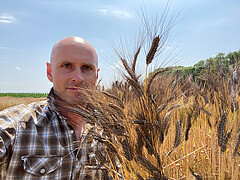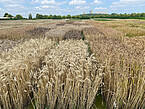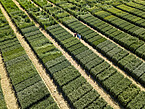Ancient grain emmer:
Variety selection and manual dexterity – the keys to success [11.04.22]
The University of Hohenheim has completed what is probably the world's largest emmer trial / large differences in varieties for over 80 traits / tips for agriculture, mills, and bakeries
So-called "ancient grain species" such as emmer are becoming increasingly popular – but their establishment is by no means a foregone conclusion. This was demonstrated by what is probably the world's largest emmer trial at the University of Hohenheim. "Even in the case of little used species such as emmer, there are dozens of varieties whose traits differ considerably," reported Prof. Dr. Friedrich Longin from the State Plant Breeding Institute at the University of Hohenheim in Stuttgart. Together with his team, he tested the traits of 143 emmer varieties at five cultivation locations in the field, mill, and bakery. "This trial enabled us to measure huge differences in field performance and in baking." Anyone who wants to use emmer successfully, should go for a reliable yield, exercise manual dexterity when baking, and engage in an exchange with the other members in the value chain. For example, at the Field and Scientific Meeting on einkorn, emmer and spelt on July 13, 2022.
Emmer is one of the oldest cereals that has been part of human diet since hunter-gatherers became sedentary farmers. After its heyday with the Egyptian pharaohs, emmer had been almost completely forgotten. Wrongly so, according to Prof. Dr. Friedrich Longin from the State Plant Breeding Institute at the University of Hohenheim.
"Emmer has only roughly half the grain yield of wheat but more straw, and this with minimal fertilization. It is, therefore, suitable for late crop rotation sites, poorer soils or generally where fertilizers are to be avoided."
Elaborate field and laboratory tests provided deep insight
Prof. Dr. Longin, together with the Detmold Institute for Cereals and Fat Analysis (DIGefa) and the plant breeding companies Südwestdeutsche Saatzucht GmbH & Co KG and Pflanzenzucht Oberlimpurg, conducted what is probably the world's largest emmer trial in order to determine the potential and possible disadvantages of emmer for agriculture, mills and bakeries. 143 emmer varieties were cultivated with a few wheat and spelt varieties as the reference for comparison at five locations in Baden-Württemberg. In the field, the researchers measured all the important agronomic traits for yield, growth behavior, and natural resistance to pathogens. Using the harvest samples, they then worked out various traits for mills and bakeries.
"One of the main project successes was the setting up of a standard milling and baking test," says Franz Pfleger of DIGefa. "Emmer has a much harder grain and very different dough traits from those of wheat. Consequently, the standard wheat trials are not suitable here." However, after some adjustments to milling and baking recipes, it was possible to highlight the differences among the 143 emmer varieties.
"Compared to wheat, emmer has higher water absorption, which means the bread stays fresh better," added Pfleger. "However, it also has far lower dough stability, and is more sensitive if the dough is over-kneaded." In order to bake successfully with emmer, the baker would have to keep these other traits of emmer in mind.
Practical tips for perfect emmer baked goods
Master baker Sebastian Brücklmaier from Bäckerei Brücklmaier in Munich is firmly convinced that this is possible in everyday bakery work. "For me, emmer is the spelt of tomorrow. It delivers exciting baked goods with a unique flavor." You just have to make good use of your manual dexterity. "Knead the dough lightly, use a pre-dough or sourdough, and add a little oil to the dough" are just a few but crucial tips from Brücklmaier.
And the bread blogger and nutritionist of ancient grain purists Stefanie Dehn raved: "Emmer is a unique grain when baking at home too, equally suited to savory and sweet baked goods." However, both bakers emphasized that emmer flour batches presented very different baking traits. They would also like to see more stable supply coupled with consistent quality.
Ancient species – modern varieties
Prof. Dr. Longin had an explanation for this: "Wheat is traded worldwide, and so mills can almost always blend consistent flour quality. Emmer, on the other hand, is rare. And if there is a sudden leap in demand, then every emmer provenance is exploited." However, what is probably the world's largest emmer trial showed that the traits of the individual varieties differed considerably. "Grain yield varied from 20 to over 50 dt/ha. And some emmer varieties could not be baked at all, despite recipe adjustments, while others produced great baked goods," reported the expert.
The choice of variety was just as important for the ancient grain emmer as it was for modern wheat. "There is always a trade-off between best field performance and best baking performance," said Prof. Dr. Longin, and he added: "We also need modern varieties of ancient species that are adapted to the changing climate and new cultivation conditions." His recommendation for the value chain: safeguard yields and quality by using lodging-resistant and high-yield varieties, and engage in an exchange with partners in the value chain.
Save the date: Field and Scientific Meeting on einkorn, emmer and spelt on July 13, 2022
Prof. Dr. Longin and his team will again host a field and scientific meeting in the afternoon on July 13, 2023 at the Agriculture Experiment Station of the University of Hohenheim if the Covid-19 situation permits. In addition to product demonstrations, there will be a field tour of the Hohenheim trials on einkorn, emmer and spelt.
There are also plans for presentations on what is probably the world's largest emmer trial, on successful baking with emmer and einkorn, and how the composition of gluten and other proteins in spelt, emmer and einkorn differs from that in wheat.
BACKGROUND to the project
The State Plant Breeding Institute at the University of Hohenheim has been working on the establishment of alternative crop varieties for many years. This work was funded by the Ministry of Rural Areas and Consumer Protection (MLR) as part of the special program to strengthen biodiversity in the state of Baden-Württemberg.
Additional information
Results of the emmer trial
Recipes for professional bakers from master baker Brücklmaier (in German)
Recipes for home baking by Stefanie Dehn (in German)
- Experts on ancient cereals on Facebook
Text: Longin / Elsner
Contact for press:
Apl. Prof. Dr. Friedrich Longin, University of Hohenheim, State Plant Breeding Institute, Wheat working group
T +49 (0)711 459 23846, E friedrich.longin@uni-hohenheim.de
Stefanie Dehn, Urkornpuristen GmbH
T +49 (0)7046 912699, E mail@urkorn.blog
Sebastian Brücklmaier, Bäckerei Konditorei Brücklmaier Betriebs GmbH
T +49 (0)89 677606, E sebastian@bruecklmaier.de






